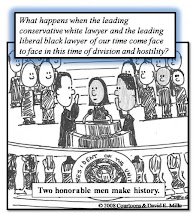
Here is a law school question for you. Realtors take note. What do you think?
The Star Tribune is reporting that a couple has sued a Minnesota realty agency for failing to disclose that a murder took place in the house they bought. The case raises questions about what real estate agents and sellers have to reveal about a home's past.
The tidy house on a quiet, suburban street immediately caught Abdelhafid Fajri's eye.
It had everything he and his wife, Kathryn, had been looking for -- a big yard, a great kitchen. And the new carpet and freshly painted walls were more than they'd hoped to find in a foreclosed house.
But the Blaine house also had a grisly past, one they discovered just days after they moved in, when a neighbor told them that the previous owner was murdered there by her husband. The Fajris have since filed a lawsuit in Anoka County District Court against Edina Realty Inc., arguing that the real estate company knew about the murder and should have told them about it.
In the suit, the Fajris contend that murder is a material fact relating to the sale of the house.
"They think they bought a lemon. They feel they were duped," said Martin Melang, the couple's attorney.
In general, real estate agents and sellers should disclose to prospective buyers if a murder has taken place on the property, experts say. Minnesota law requires licensed agents to disclose anything that they know of that could affect an ordinary person's use or enjoyment of the property.
My gut reaction is that a prior murderous act can have enough of an emotional significance so that a new owner would want to know. You can bet it was one of the first things she learned AFTER she moved in from the old neighbors. Consumers should be entitled to make knowing choices, and sure, they could have asked around, but it is not something I think a realtor should have concealed. It could have been a bargaining tool for the new owner. And it certainly can be considered a material misrepresentation of omission. Grandma used to say 'half a truth is a whole lie.'
































Actually Norm, this is an issue that has been specifically addressed by the Florida legislature.
ReplyDelete689.25 Failure to disclose homicide, suicide, deaths, or diagnosis of HIV or AIDS infection in an occupant of real property.
(1)(a) The fact that an occupant of real property is infected or has been infected with human immunodeficiency virus or diagnosed with acquired immune deficiency syndrome is not a material fact that must be disclosed in a real estate transaction.
(b) The fact that a property was, or was at any time suspected to have been, the site of a homicide, suicide, or death is not a material fact that must be disclosed in a real estate transaction.
(2) A cause of action shall not arise against an owner of real property, his or her agent, an agent of a transferee of real property, or a person licensed under chapter 475 for the failure to disclose to the transferee that the property was or was suspected to have been the site of a homicide, suicide, or death or that an occupant of that property was infected with human immunodeficiency virus or diagnosed with acquired immune deficiency syndrome.
--------
Florida law does impose a duty on real estate brokers and sales people in residential transactions to disclose all known material conditions adversely affecting the value of residential property which are not readily observable to the buyer (Johnson v. Davis, 1985 Fla. S.Ct. case which ditched caveat emptor in Florida residential real estate transactions).
However, this common law duty was preempted in this particular circumstance by this statute.